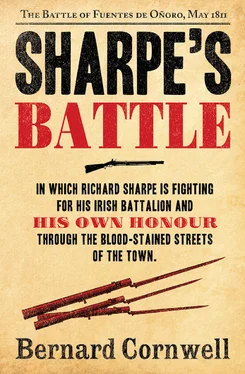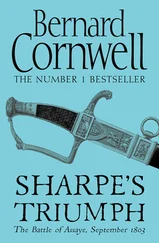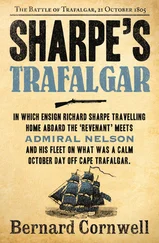1 ...8 9 10 12 13 14 ...21 He turned back to the window as the sound of hooves echoed in the fortress’s entrance tunnel. Ducos listened as the challenge was given, then he heard the squeal of the gate hinges opening and a second later he saw a group of grey horsemen appear in the flamelit archway.
The Doña Juanita de Elia had come to stand beside Ducos. She was so close that he could smell the perfume on her gaudy uniform. ‘Which one is he?’ she asked.
‘The one in front,’ Ducos replied.
‘He rides well,’ Juanita de Elia said with grudging respect.
‘A natural horseman,’ Ducos said. ‘Not fancy. He doesn’t make his horse dance, he makes it fight.’ He moved away from the woman. He disliked perfume as much as he disliked opinionated whores.
The two waited in silent awkwardness. Juanita de Elia had long sensed that her weapons did not work on Ducos. She believed he disliked women, but the truth was that Pierre Ducos was oblivious of them. Once in a while he would use a soldier’s brothel, but only after a surgeon had provided him with the name of a clean girl. Most of the time he went without such distractions, preferring a monkish dedication to the Emperor’s cause. Now he sat at his table and leafed through papers as he tried to ignore the woman’s presence. Somewhere in the town a church clock struck nine, then a sergeant’s voice echoed from an inner courtyard as a squad of men was marched towards the ramparts. The rain fell relentlessly. Then, at last, boots and spurs sounded loud on the stairway leading to Ducos’s big chamber and the Doña Juanita looked up expectantly.
Brigadier Loup did not bother to knock on Ducos’s door. He burst in, already fuming with anger. ‘I lost two men! God damn it! Two good men! Lost to riflemen, Ducos, to British riflemen. Executed! They were put against a wall and shot like vermin!’ He had crossed to Ducos’s table and helped himself from the decanter of brandy. ‘I want a price put on the head of their captain, Ducos. I want the man’s balls in my men’s stewpot.’ He stopped suddenly, checked by the exotic sight of the uniformed woman standing beside the fire. For a second Loup had thought the figure in cavalry uniform was an especially effeminate young man, one of the dandified Parisians who spent more money on their tailor than on their horse and weapons, but then he realized that the dandy was a woman and that the cascading black plume was her hair and not a helmet’s embellishment. ‘Is she yours, Ducos?’ Loup asked nastily.
‘Monsieur,’ Ducos said very formally, ‘allow me to name the Doña Juanita de Elia. Madame? This is Brigadier General Guy Loup.’
Brigadier Loup stared at the woman by the fire and what he saw, he liked, and the Doña Juanita de Elia returned the Dragoon General’s stare and what she saw, she also liked. She saw a compact, one-eyed man with a brutal, weather-beaten face who wore his grey hair and beard short, and his grey, fur-trimmed uniform like an executioner’s costume. The fur glinted with rainwater that had brought out the smell of the pelts, a smell that mingled with the heady aromas of saddles, tobacco, sweat, gun oil, powder and horses. ‘Brigadier,’ she said politely.
‘Madame,’ Loup acknowledged her, then shamelessly looked up and down her skin-tight uniform, ‘or should it be Colonel?’
‘Brigadier at least,’ Juanita answered, ‘if not Maréchal .’
‘Two men?’ Ducos interrupted the flirtation. ‘How did you lose two men?’
Loup told the story of his day. He paced up and down the room as he spoke, biting into an apple he took from Ducos’s desk. He told how he had taken a small group of men into the hills to find the fugitives from the village of Fuentes de Oñoro, and how, having taken his revenge on the Spaniards, he had been surprised by the arrival of the greenjackets. ‘They were led by a captain called Sharpe,’ he said.
‘Sharpe,’ Ducos repeated, then leafed through an immense ledger in which he recorded every scrap of information about the Emperor’s enemies. It was Ducos’s job to know about those enemies and to recommend how they could be destroyed, and his intelligence was as copious as his power. ‘Sharpe,’ he said again as he found the entry he sought. ‘A rifleman, you say? I suspect he may be the same man who captured an eagle at Talavera. Was he with greenjackets only? Or did he have redcoats with him?’
‘He had redcoats.’
‘Then it is the same man. For a reason we have never discovered he serves in a red-jacketed battalion.’ Ducos was adding to his notes in the book that contained similar entries on over five hundred enemy officers. Some of the entries were scored through with a single black line denoting that the men were dead and Ducos sometimes imagined a glorious day when all these enemy heroes, British, Portuguese and Spanish alike, would be black-lined by a rampaging French army. ‘Captain Sharpe,’ Ducos now said, ‘is reckoned a famous man in Wellington’s forces. He came up from the ranks, Brigadier, a rare feat in Britain.’
‘I don’t care if he came up from the jakes, Ducos, I want his scalp and I want his balls.’
Ducos disapproved of such private rivalries, fearing that they interfered with more important duties. He closed the ledger. ‘Would it not be better,’ he suggested coldly, ‘if you allowed me to issue a formal complaint about the execution? Wellington will hardly approve.’
‘No,’ Loup said. ‘I don’t need lawyers taking revenge for me.’ Loup’s anger was not caused by the death of his two men, for death was a risk all soldiers learned to abide, but rather by the manner of their death. Soldiers should die in battle or in bed, not against a wall like common criminals. Loup was also piqued that another soldier had got the better of him. ‘But if I can’t kill him in the next few weeks, Ducos, you can write your damned letter.’ The permission was grudging. ‘Soldiers are harder to kill than civilians,’ Loup went on, ‘and we’ve been fighting civilians too long. Now my brigade will have to learn how to destroy uniformed enemies as well.’
‘I thought most French soldiers would rather fight other regulars than fight guerrilleros ,’ the Doña Juanita said.
Loup nodded. ‘Most do, but not me, madame. I have specialized in fighting the guerrilla .’
‘Tell me how,’ she asked.
Loup glanced at Ducos as if seeking permission, and Ducos nodded. Ducos was annoyed by the attraction he sensed between these two. It was an attraction as elemental as the lust of a tomcat, a lust so palpable that Ducos almost wrinkled his nose at the stench of it. Leave these two alone for half a minute, he thought, and their uniforms would make a single heap on the floor. It was not their lust that offended him, but rather the fact that it distracted them from their proper business. ‘Go on,’ he told Loup.
Loup shrugged as though there was no real secret involved. ‘I’ve got the best-trained troops in the army. Better than the Imperial Guard. They fight well, they kill well and they’re rewarded well. I keep them separate. They’re not billeted with other troops, they don’t mix with other troops, and that way no one knows where they are or what they’re doing. If you send six hundred men marching from here to Madrid then I guarantee you that every guerrillero between here and Seville will know about it before they leave. But not with my men. We don’t tell anyone what we’re doing or where we’re going, we just go there and do it. And we have our own places to live. I emptied a village of its inhabitants and made it my depot, but we don’t just stay there. We travel where we will, sleep where we will, and if guerrilleros attack us they die, and not just them, but their mothers, their children, their priests and their grandchildren die with them. We horrify them, madame, just as they try to horrify us, and by now my wolf pack is more horrifying than the partisans.’
Читать дальше












